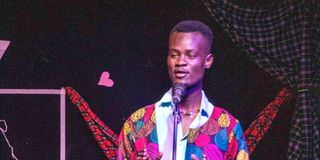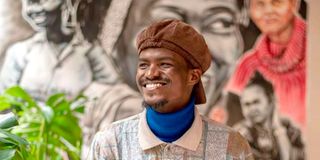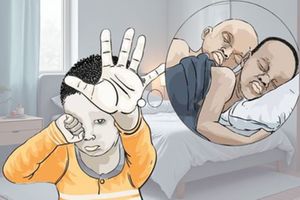
As the world’s social structure grows and evolves, a surprising number of young individuals are shunning the party atmosphere as the main source of entertainment. Instead, they’re choosing to build close-knit communities where connection, creativity, and purpose are the main focus.
These gatherings offer a break from loud music and late-night partying, and focus on genuine relationships and shared experiences.
Many of these gatherings are drug-free and aim to nurture deeper relationships, appealing to creatives, professionals and students who prefer a more meaningful way to relax without indulging in drugs or alcohol.

Keith Angana, 23, Co-founder and Executive Director of Qwani
I noticed early on that urban areas lack a strong sense of community, unlike rural settings where extended families live together and interact regularly. In cities, people tend to isolate themselves, socialising mostly with colleagues or school friends, which leads to loneliness. Luckily, my extended family maintains close ties even though most of us live in the city.
I sometimes feel strange telling my friends I spend weekends with my family. They tend to feel left out. When I share the nice experiences we record with my family members, I notice that it makes them think about how disconnected they are from their own families.
It is for this reason that I thought of creating an outfit that could bring people closer together.
At Qwani, what sets us apart is that our gatherings aren’t centred around alcohol, unlike many social events in the city. Instead, we focus on activities that foster meaningful connections. Some say they struggle to open up and bond without alcohol, but we create opportunities to network and build relationships through shared experiences and creative pursuits, without drinking. Our events are usually free or low-cost, much cheaper than nights out at bars or clubs.
Our activities include book-writing projects where we produce an anthology every year featuring young writers. We go for hikes every month and attend cycling events outside the city twice every month.
Activities such as reading salons, poetry readings, open mics, karaoke, painting parties, sketch tours, and photography walks offer creative outlets. We also organise theatre performances, trivia nights, film screenings, and comic workshops. There is always something happening at Qwani. Themed picnics and fun days in parks add a layer of joy. We focus on creativity and believe these events promote genuine connections.
What makes our community feel like home is how we value every member. I always welcome new members personally. If they return and I remember our last conversation, it strengthens our bond. By the third visit, when I acknowledge their contributions, they know they’re truly part of the group. This personal touch is what makes Qwani special.
We attract young people from all social classes, including the "cool kids," and even celebs. Ironically, I don’t see myself as one of them. I'm more of a ghetto guy, so it's amusing to lead such a vibrant community.
I believe the internet has weakened the community’s social fabric. Many are glued to their phones even at social gatherings, which makes it difficult to establish real connections. This is something we are countering with Qwani.
It is hard to maintain social ties because young people’s lives are quite dynamic. Some members have moved abroad or outside Nairobi for jobs, which is sad because they can no longer attend meetings regularly.
Growing our numbers is also tough. Even though we offer great activities, attracting new people isn’t always easy. Sometimes I think a billboard or newspaper feature could boost our visibility.
Ultimately, I hope Qwani helps people love life. Life is beautiful when shared with people you care about, and that’s what I want our community to bring out. I want to help creatives succeed, whether in music, art, writing, or other fields. We keep our members engaged with plenty of activities that encourage them to get out of the house. We always say, “Why stay home when Qwani exists?”
Our events are interactive and inclusive, ensuring everyone feels involved. I’ve noticed friendships built in communities like ours last longer than those formed around clubbing or fleeting social scenes. Plus, clubbing can be expensive, while real connections don’t need much money to thrive.
We started as a hub for writers, but we’ve expanded to include poets, musicians, painters, actors, scriptwriters, filmmakers, and more. Most of our members are Gen Z, but we’re hoping to attract more millennials as well. Initially based in Nairobi, we now have branches in Mombasa, Eldoret, Nakuru, and Kisumu, with plans to expand to every town in Kenya.
My advice to anyone looking to start something similar? Just start. Use what you have, and let things evolve as you go.

Oyamo Richard, 24, Programs Manager at Rafinki
I am a writer, poet, editor, and the programs and partnerships manager at Rafinki. I’ve performed in various shows and published two books – a poetry anthology titled Musings on Life and The Kenyan Gen Z Protest Lexicon, which documents the unique protests led by Gen Z in Kenya early this year. I’m particularly proud of the latter, as it captures the youth's role in establishing change.
I co-founded Rafinki in 2019, inspired by a desire to bring creatives together. Rafiki means "friend" in Kiswahili, while ‘ink’ is a symbol of the creativity of writers and artists.
The idea came to me while I was a student at Kenyatta University. While attending various art events, I often met poets and writers from KU, but we didn’t know each other. It struck me that there was no dedicated space within our university for us to connect.
We initially tried to establish a club for poets and writers at KU, but bureaucratic challenges made registration difficult. Instead, we broadened our vision to include creatives from other institutions, which saw Rafinki evolve into an inclusive society for poets, writers, and visual artists.
Rafinki is a community strictly for creators, not just fans of art. We aim to exchange ideas and create opportunities for collaboration. While we socialise and have fun, our primary focus is on artistic and personal development.
We host monthly workshops at venues like Alliance Française where we discuss matters relevant to creatives, including financial management, intellectual property rights, marketing, and branding. These sessions equip members with skills for success in the industry. We also organise monthly open mic events at Baraza Media Lab where poets, spoken word artists, and musicians can showcase their talents and receive feedback.
Rafinki also emphasises building strong connections. We organise outings to art galleries, nature trails, and other creative spaces for members to unwind, bond, and get inspiration.
However, we face challenges, primarily financial ones, since many of us are fresh out of campus and unemployed. Another challenge is maintaining relevance. As members grow in their creative careers, some feel they’ve outgrown our projects. We’re working on creating advanced opportunities for those who have progressed in their careers.
To add, many members have moved out of Nairobi after graduation, complicating in-person meetings and events.
Despite these challenges, our vision remains to empower creatives to use their art as a tool for social change while helping them find ways to earn a living from their craft.

Brian Khavalaji, 27, Founder of Tabasamu Concepts
I started my community by posting photos of myself smiling, with the caption '#SmileyDayAhead.' A friend suggested I turn that into something bigger, which led to the idea of hosting a small group of creatives for coffee.
After a planned picnic failed, I found individuals who shared my vision, and I secured a larger venue where we could meet. Following our first event, attendees requested monthly gatherings, and that’s how we started creating spaces for unwinding and networking. My goal was to build a space where myself and others could feel comfortable.
While we aim to have fun, all our events are drug-free, proving that we can enjoy ourselves without substances. I’m constantly experimenting with new ideas to cater to the diverse needs of my audience.
We focus on creating experiences and helping people unwind from their hectic schedules. We've organised painting events, live music, outdoor hangouts, poetry readings, and gallery exhibitions, and are always seeking new ways for attendees to relax.
I strive to keep our hangouts affordable so that more people can attend. Beyond events, I build genuine friendships by checking up on members and involving them in planning.
Our hangouts attract a diverse crowd—students, young professionals, fresh graduates, and Gen Zs seeking spaces to socialise and network. The drug-free environment appeals to those uninterested in typical party scenes, and our affordability draws in those who may struggle to attend more expensive gatherings.
I don’t believe platforms like TikTok or Instagram hinder community building, they can encourage more connections. However, social media can create a false sense of connection.
Growing and maintaining the community has its challenges. It is difficult to remain affordable while providing quality experiences, especially in Nairobi, where venues are costly. I started without experience and made mistakes, leading to some early negative experiences. However, I've learned from these setbacks and improved my event planning skills.
To keep people engaged, we host monthly hangouts and maintain WhatsApp groups for banter and connection.
I believe Gen Zs prefer tribe-building over clubbing because these communities offer a sense of purpose beyond just fun. Here, you find people with common interests, which can be more fulfilling than a night out at the club.
Our experiences have improved, and our group has grown. What began as a small circle of friends has expanded into a diverse gathering. I’ve witnessed meaningful friendships, collaborations, and even romantic relationships form through our events.
Looking ahead, I want to expand Tabasamu Concepts into a full-fledged events company. There’s a growing need for mental health conversations, which I plan to incorporate into future events.
For anyone looking to build a tribe or community, my advice is, just start. I envisioned a circle of 10 friends, but our events now host around 50 on average. Identify a niche or purpose, gather like-minded people, and begin. Use affordable spaces like parks and learn as you go. There’s a tribe for everyone, you just have to find your people.

Cynthia Nkanai, 24, Co-founder of This Is Me Community
I am a digital creator on Instagram and a social impact influencer. I co-founded This Is Me Community in 2018, and we focus on creating spaces where people can build genuine relationships and contribute meaningfully to their communities.
I’ve always had a passion for community outreach, but I wanted our activities to be engaging, different, and impactful. Our focus is always on fostering genuine connections. For example, when we visit children’s homes, we encourage meaningful interactions with the children.
Our activities are structured around three core areas – impact projects, community hangouts, and events. Impact projects give young people an avenue to give back, while community gatherings help members connect and grow. For instance, we hold self-development classes where we discuss topics like financial literacy or body image. The events are open to everyone, and serve as fundraisers that also raise awareness about our mission.
We foster connections through discussions that encourage openness and introspection. When people come to our spaces, they feel comfortable enough to open up and connect through shared stories. Our members are mostly young people who want to make a difference, and they’re drawn to us because of the unique mix of activities we offer. It’s not just about socialising, it is about finding a space where you can truly be yourself and explore different aspects of yourself.
Social media has been instrumental in helping us grow. Platforms like Instagram and TikTok allow us to reach people who resonate with our mission.
Of course, we’ve faced challenges, especially financially. Since we’re self-funded, many of our members are students or recent graduates, which sometimes makes fundraising difficult, but we keep pushing because we believe in the positive impact we’re creating.
I hope our work inspires members to be more socially conscious and compassionate. I’d love for people to think beyond themselves and perhaps contribute to causes that support the less fortunate.
Some of our members have gone on to create their own initiatives inspired by This Is Me, which makes me incredibly proud.
As members of Gen Z, we are keen on creating change, and that’s been a huge factor in our growth.
In future, I see This Is Me becoming a structured and influential youth initiative on a national level. I’d like us to become something akin to St John’s Ambulance, but with a focus on community impact.
For anyone wanting to build their community, I’d say know your purpose because that’s what will sustain you when things get tough. Be authentic, stay true to yourself, and have fun. People are naturally drawn to genuine energy, and as long as you’re connected to something bigger than yourself, your community will grow.












